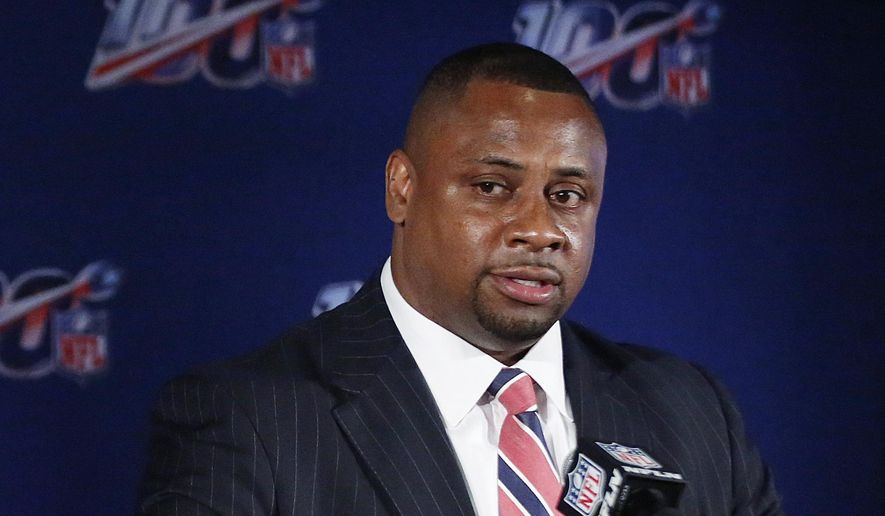On my office wall hangs a framed NFL jersey. It is dark brown with white and orange stripes on the sleeves, and the broad white number 32. It is signed by Jim Brown, arguably the greatest to ever play the game. This jersey is a daily reminder of the pursuit of perfection as well as the struggle to achieve excellence, a struggle which continues long after the playing days are over.
Jim Brown and his teammate, John Wooten, now are in their 80s. They played football during an era when the annual salary was less than many players are paid per game today, and the benefits, well, they were next to none. For half a century these men and those who played the game in the 1960s and 70s have struggled to receive small and incremental health and retirement benefits. From pain management to basic health care, this group of players was mostly on its own.
These were the generation of men who ushered in the greatest sports business in the world. It was upon their shoulders that media contracts, free agency, salary caps, benefit packages, health and safety rules, and much more was built. Many generations of players would benefit from these men and the trailblazing sacrifices they made. As John Wooten has often said: “We drink from wells we did not dig.”
As a former player, a former labor leader, and now an NFL executive, that quote and that number 32 jersey are a daily and driving force, leading me to do whatever possible to advance the goals of equality and inclusion that these gallant men so admirably pursued. They also inspired me to work to honor their legacy by helping ensure that their quality of life reflected their contributions to the game. For years, they and a vast number of NFL legends have been sharing their struggles with quality of life and health care, and receiving what to them were only modest and incremental improvements. In my roles throughout the past 20 years, their anxiety, pain and frustrations are validated and acknowledged.
Many players, including Jim Brown, were skeptical that they would ever see any type of meaningful improvements in quality of life benefits coming from their former employer and the union that represented them.
The league and the NFL Players Association, however, not only heard the stories of these legends, they listened and acted. The new collective bargaining agreement ensures that thousands of former players and their beneficiaries will see their pensions increase by 50 percent or more. For example, a running back with seven years in the league who retired in the 1970s or 1980s will see his pension grow from just over $30,000 per year to more than $46,000 per year for the rest of his life.
Those players who were never eligible for pensions will now receive a pension of almost $20,000 per year. And if the NFL continues to grow as it has in recent years, pensions will increase midway through the current CBA, which expires after the 2030 season.
Those players who retired before the Health Reimbursement Account benefit was established will now have a $50,000 HRA to help pay for insurance or other health and medical bills. More than 4,400 former NFL players now have access to this benefit.
The establishment of a national hospital network also will provide much-needed primary care and health services such as screenings, mental health services, and orthopedic care at no cost to former players.
As Jim Brown points out in his recent Op-ed in The New York Times, the 2020 CBA “provides unprecedented improvements in benefits that will help transform the lives of thousands of former NFL players and their families.” Player leadership is key to these advances.
While honoring those who came before them, today’s players recognized the justice for improved quality of life for both those who played in the past, as well as for those who are playing now. In their compassion, they answered the question: “How are we treating our heroes?” And the clubs similarly understood the need for these improvements and strongly supported including them in the new labor contract. This is the power of influence when leadership works to do the right thing.
These new benefits are game changers. No, life changers. The new and higher pensions, increases in insurance, and health services provide much needed support for former players and their families. From pain management to primary care to mental health services, the quality of life for former players and their families will improve tremendously.
We may not be over the mountaintop as yet. There will always be more to do. We have, however, ascended the mountain, and as we peek toward the summit, we can see a more dignified, brighter quality of life for those who have paved the way for the game we love.
___
Troy Vincent is the NFL’s executive vice president of football operations. He was a five-time Pro Bowl cornerback between 1992-2006 and served as president of the NFLPA from 2004-08.
___
More AP NFL: https://apnews.com/NFL and https://twitter.com/AP_NFL




Please read our comment policy before commenting.